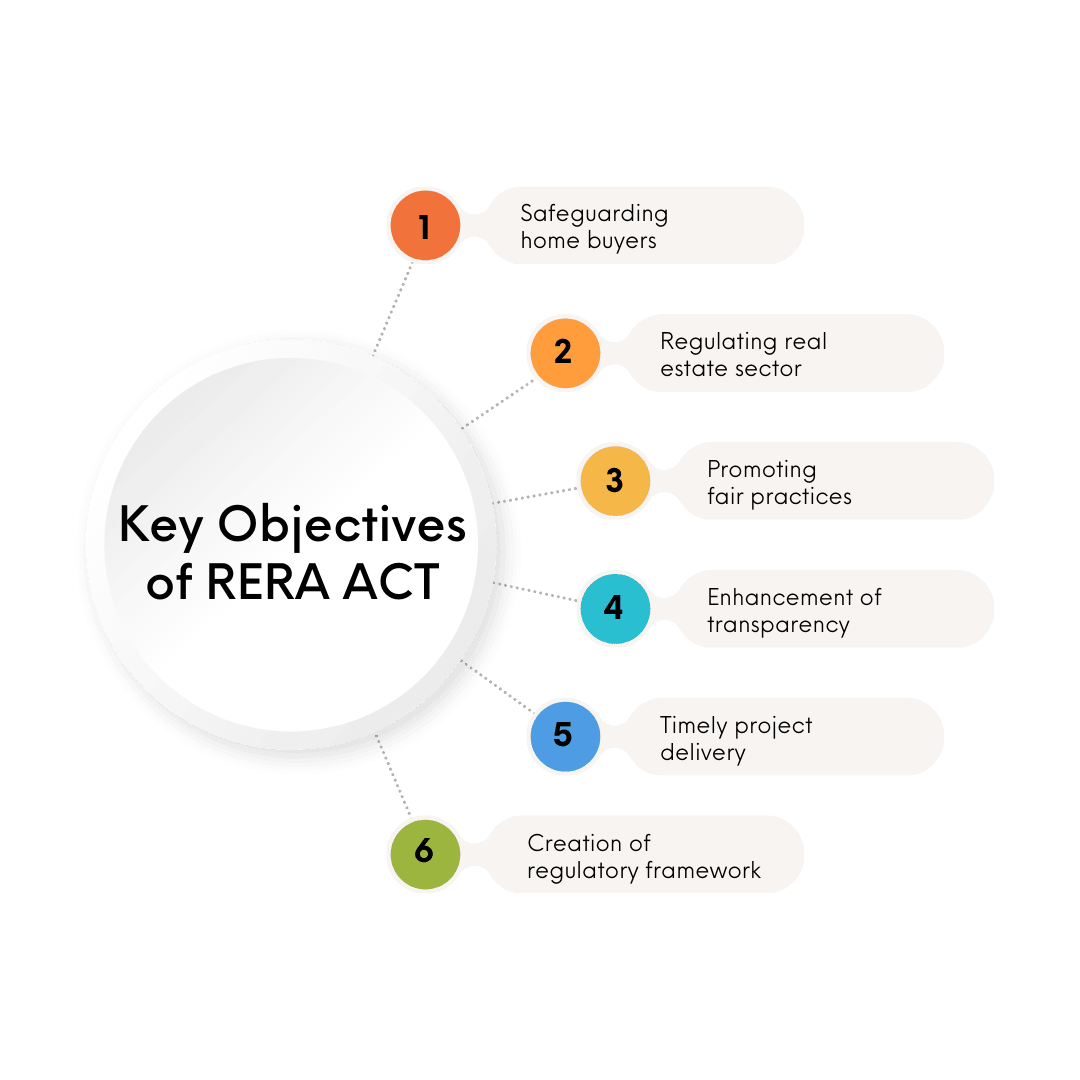What is the RERA Act?
- June 19, 2024
- Registrationwala

- Home
- /
- Knowledge Base
- /
- Misc
- /
- RERA Registration
- /
- What is the RERA Act?
What is the RERA Act?
Buying a house can cost you a fortune; not everyone can afford it. Some spend years or even their entire life to collect the money to buy it. Most people can afford to buy only one house in their whole lifetime. So it is crucial for these people to have an authority which protects their rights when it comes to buying houses. After realizing this necessity, in 2016, the Parliament of India passed the Real Estate (Regulation and Development) Act. This Act was passed with the intention of protecting the interests of home buyers and to facilitate a timely completion of projects by the developers of the real estate sector.
This Act plays a significant role in providing a fair and responsible domain for all the stakeholders i.e., real estate developers, real estate agents and the buyers. Under this Act, a Real Estate Regulatory Authority (RERA) was established in each state in order to regulate the sector of real estate. RERA serves as an adjudicating body so that it can provide quick dispute resolution between buyers and sellers. The RERA bill was passed by Rajya Sabha on 10th March, 2016 and then by Lok Sabha on 15th March, 2016. The Act came into force shortly on 1st May, 2016.
All the real estate projects are required to get RERA registration. After this, they are issued a certificate which has a unique registration number. This certificate mentions has all necessary details about the property. Developers, builders and property agents are not permitted to do advertising, booking or selling of real estate if they do not have RERA certificate.
RERA Act’s Functions

The main functions of The Real Estate (Regulation and Development) Act, 2016, are mentioned below:
- RERA protects home buyers' interests as it promises clarity, responsibility and practices which are ethical. It gives buyers the correct information about the projects and their timelines.
- RERA regulates the real estate market by making project registration mandatory with the regulatory authority.
- It aims to promote fair practices in order to create a level playing field for both developers and sellers and prohibits unfair trade practices such as misleading advertising.
- It enhances transparency in the sector by mandating project details disclosure, including approvals, layout plans and timelines for delivery. This rules out any chances for information asymmetry and helps to build trust between developers and buyers.
- RERA ensures delivery of projects on time by the real estate developers. If there are any delays, the developers are held responsible.
- It establishes a regulatory framework and defines rights and responsibilities of the various stakeholders such as developers, real estate agents and buyers. It aims to promote professionalism in the real estate industry.
RERA Act’s impact on the real estate industry
The Real Estate (Regulation and Development) Act, 2016 is aimed at bringing transparency and ethical practices in the real estate industry.
Since its implementation, the RERA Act has had a great impact on the Indian real industry:
- RERA Act makes it mandatory for the developers to get their projects registered with RERA authority in their state. These developers have to provide detailed information about the project which includes necessary approvals, timelines, and the progress of the project. Due to this, the transparency in the real estate sector has increased.
- By issuing clear guidelines for the builders concerning project delivery, timelines and construction quality, RERA increases consumer protection. If the buyers have any complaints regarding such matters, they can go to RERA for a speedy resolution.
- If there are any delays on the end of developers, misleading ads or deviation from the actual plans, then the developers will be held accountable for them.
- RERA ensures standardization in the real estate sector by defining the carpet area, ensuring fair practices when it comes to transactions, and standardizing the agreements between buyers and the sellers.
- Due to the increased transparency and consumer protection which RERA provides, the confidence of the investors has been boosted in the real estate market. This has led to the rise in investment opportunities.
- Developers have to make use of the best technology and streamline their operations according to the RERA requirements. In order to maintain their reputation, they have to focus on delivering quality projects.
Conclusion
Ever since the RERA authorities were set up in different states, significant changes have been brought to the real estate industry. The clarity and ethical practices are constantly promoted by these authorities. Many disputes are resolved in a speedy manner so that the interests of home buyers are protected. RERA prevents the home buyers from being victims of real estate scams by upholding their rights. As for the sellers, having a RERA certificate makes them seem more genuine to the buyers due to which they are more likely to get business.
Frequently Asked Questions (FAQs)
Q1. What is RERA ACT?
A. The Real Estate (Regulation and Development) Act, 2016 is an Act of the Parliament of India which aims to protect the interests and ensures a timely completion of projects. It promotes a fair and accountable environment for all the stakeholders. Under this Act, a Real Estate Regulatory Authority (RERA) is established in each state in order to facilitate regulation of the real estate sector.
Q2. Can real estate agents sell a property without RERA certification?
A. All the real estate projects that are registered with RERA are issued a certificate which has a unique registration number. This certificate has all necessary details about the property. Developers, builders and property agents are not permitted to do advertising, booking or selling of real estate if they do not have RERA certificate.
Q3. Is RERA applicable to all states in India?
A. Yes, RERA is applicable to all states and union territories.
Q4. How does RERA ensure transparency in the real estate sector?
A. It enhances transparency in the sector by making it mandatory to project details disclosure, including approvals, layout plans and timelines for delivery. This rules out any chances for information asymmetry and helps to build trust between developers and buyers.
- 926 views
